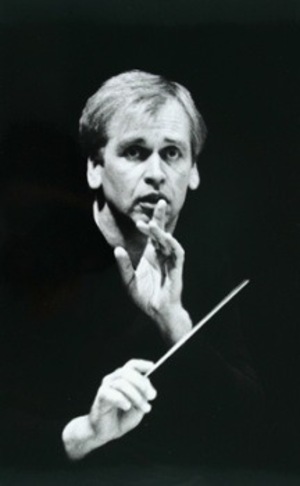PUZZLE OF OPERAS AND JOKES: “OPERA IMPOSSIBILE” 0
Gintaras Rinkevičius. Photo from Opera.lv
In brief: One could enjoy a real puzzle of operas, symphony and popular music compositions at Kaunas State Philharmonic Hall on the 20th of December. The symphony drama was presented by Gintaras Rinkevičius and the Lithuanian State Symphony Orchestra. Famous opera characters were embodied by soloists Lauryna Bendžiūnaitė (soprano), Ieva Prudnikovaitė (mezzo soprano), Rafailas Karpis (tenor) and Vladimiras Prudnikovas (bass) that evening.
The merry collection of opera music pieces was called “Opera Impossibile” (Italian for “Impossible Opera”). This creative solution amused the audience greatly. The main idea of jokes of “Opera Impossibile” was the exchanged male and female roles. During the concert Rafailas Karpis became a charming blond, while Vladimiras Prudnikovas turned into a passionate brunette. Lauryna Bendžiūnaitė and Ieva Prudnikovaitė stepped on the stage in male costumes.
Although the view was banal, it was rejoicing that the sound was good. The most famous arias were performed professionally, beautifully and persuasively. R. Karpis charmed the most by his role of the tender and doleful Violetta (from the opera by G. Verdi “La Traviata”). The character of Lensky created by L. Bendžiūnaitė (from the opera by P. Tchaikovsky “Evgeny Onegin”) was also memorable: she performed the aria lyrically and sensitively, sarcastically and mockingly at the same time. In some way the performed succeeded to combine two different things: pain and self-irony.
The Lithuanian State Symphony Orchestra made a good impression too: it sounded harmoniously, solidly and emotionally. It played, sang and clapped rhythmical elements along with the conductor The orchestra was joined by V. Prudnikovas for a while who sat down at the piano and played an extract from the concert of P.Tchaikovsky for the piano and orchestra No. 1, b minor.
As the word opera was included into the title of the symphony drama “Opera Impossibile”, the action of soloists on the stage was not forgotten. The rather small stage of Kaunas State Philharmonic Hall was decorated by various items used in other opera performances. Effects of light, or darkness to be more specific, were used. Still, a question appeared whether the entire symphony drama “Opera Impossibile” was not a collection of effects only? Moreover, the music piece is called a drama; therefore, a drama action should have been present in it. It is hard to say whether it was missing or was not noticed when the full attention was concentrated on famous arias, their performance, various effects and guesses what music piece resounded at a certain moment.
The organic transition from one part of the symphony drama to another surprised pleasantly. Especially, having in mind that the combined pieces differed stylistically and historically: the temperamental “Carmen” of G. Bizet turned into the dramatic “La Traviata” of G. Verdi insensibly, this musical part – into the merry “The Barber of Seville” by G. Rossini, the latter was replaced by the tragic “Evgeny Onegin”, etc. It is impossible to name all the compositions that resounded during the concert, and it is most probably not necessary. It is more important to note that they all created a solid music piece: most probably much effort was put to create this scheme of sequence of opuses.
Finally, the performed music pieces were really popular and known to almost everyone. The opera jokes with a shade of commerce appeared to be good entertainment for the audience of Kaunas State Philharmonic Hall. Perhaps nobody searched for the symphony drama, deep thought or academic features during the evening. The listeners rejoiced hearing a familiar music piece performed in virtuoso manner and untraditionally. Thus, if “Opera Impossibile” was really meant to be a merry joke, it was successful.

